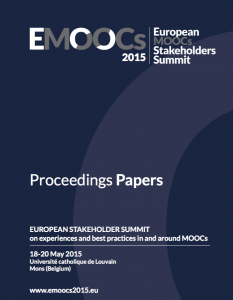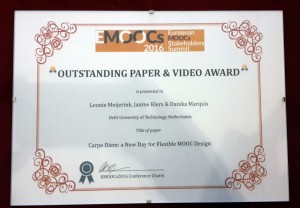Posts tagged Kiers
MOOCs and their Effect on the Institution
Paper was published in journal Foro de Educación.
Abstract
Four years after the introduction of MOOCs – which were proclaimed to be «the end of education as we know it» in 2012 – the role and effect of these free, online courses is becoming clearer. The online means of delivery to the heterogeneous audiences of MOOCs have enabled and compelled instructors and course teams to develop innovative and flexible learning materials. We can analyse the data on the study behaviour of learners to identify which course elements are effective. In addition, the integration of elements of MOOCs in campus education has resulted in promising outcomes and positive reactions from both students and teachers. On the level of the institution, we also see the effect of MOOCs: ranging from new possibilities in communication and branding, to new needs for faculty development and the support organisation. Furthermore, MOOCs play a role in the unbundling of education, e.g. the learning experience and the assessment tasks now can be uncoupled and may be delivered by different institutions and by different means: the learning experience may be in the form of a MOOC and the assessment may be a written exam at an institution.
Reference
Kiers, J. (2016). MOOCs and their Effect on the Institution: Experiences in Course Design, Delivery and Evaluation; Research; Faculty Development; Unbundling and Credits for MOOCs. Foro de Educación, 14(21), 133-149. doi:http://dx.doi.org/10.14516/fde.2016.014.021.007
Download Paper
- Download paper (PDF)
EMOOCS2016: Guidelines for Evaluating the Teaching and Learning in MOOCs: a TU Delft approach
Paper presented at the EMOOCS 2016 conference in Graz, Austria.
Abstract
What does it mean to qualify as a ‘successful’ MOOC? This question haunts policy makers and educators alike, and is at the core of the continued development and funding for Massive Open Online Courses. Because MOOCs can serve many purposes, their value lies in more than just their short-term educational role. A ‘successful’ MOOC can do more than just teach; it can provide institutional brand recognition, address global challenges, improve the quality of campus education, and generate data for educational research. In this paper, we examine the
methods and tools TU Delft uses to evaluate the teaching and learning within its own MOOCs in particular. Recommendations are provided for the use of a set of qualitatitve tools in addition to the more common quantitative tools used to evaluate the ‘success’ of a MOOC.
Reference
Marquis, Danika; Kiers, Janine; Meijerink, Leonie (2016). Guidelines for Evaluating the Teaching and Learning in MOOCs: a TU Delft approach. In Proceedings of the EUROPEAN STAKEHOLDER SUMMIT on experiences and best practices in and around MOOCs (EMOOCS 2016). http://emoocs2016.eu/wp-content/uploads/2016/02/proceedings-emoocs2016.pdf. ISBN 9783739237107 (page 447-459)
Slides
Paper
Paper is part of the conference proceedings (page 447-459)
EMOOCS2016: Carpe Diem: a new day for flexible MOOC design
Paper presented at the EMOOCs 2016 conference in Graz, Austria. The paper was awarded the outstanding paper & video award.
Abstract
Is there one approach to course design that can be recommended in engineering education? At Delft University of Technology (TU Delft), we designed and developed 25 MOOCs, and our experience and expertise in course design is advancing.
One of the frequently used approaches for supporting course teams was inspired by the Carpe Diem approach (Salmon 2014). This paper discusses the experience of TU Delft in implementing this methodology in an engineering setting in MOOCs. The reason for choosing the Carpe Diem approach is that it is simple to use, supports constructive alignment and is a team based approach. In the approach a more activity-based design of MOOCs is promoted through developing e-tivities. In this article the experiences of e-learning developers are described in supporting ten course teams (5 online courses and 5 MOOCs) using the Carpe Diem approach. Two main challenges in supporting course teams are highlighted;
I. How to introduce course teams to the value of the methodology and
II. How to ensure that the specific characteristics of a MOOC are embedded in the design.
For both challenges a range of ‘proposed solutions’ is suggested based on the experiences of the e-learning developers. This results in lessons learned that can be applied by anyone who would like to make use of the Carpe Diem approach for flexible MOOC design. This paper argues that the Carpe Diem approach needs to be used in an interactive and flexible way, taking into account the diversity of the course teams and course leaders as well as the special characteristics of a MOOC.
Reference
Meijerink, Leonie; Kiers, Janine; Marquis, Danika (2016). Carpe Diem: a new day for flexible MOOC design. In Proceedings of the EUROPEAN STAKEHOLDER SUMMIT on experiences and best practices in and around MOOCs (EMOOCS 2016). http://emoocs2016.eu/wp-content/uploads/2016/02/proceedings-emoocs2016.pdf. ISBN 9783739237107 (page 425-438)
Video
Slides
Paper
Paper is part of the conference proceedings (page 425-438)
EMOOCs 2015: Experiences from 18 DelftX MOOCs
 Paper presented at the European Stakeholders summit on experiences and best practices in and around MOOCs in Mons, Belgium (18-20 May 2015).
Paper presented at the European Stakeholders summit on experiences and best practices in and around MOOCs in Mons, Belgium (18-20 May 2015).
Abstract
This paper describes experiences and lessons learned from developing, building and running 18 MOOCs (including 4 reruns) at the Delft University of Technology, namely the selection of courses, the design, development and delivery of courses, innovative educational elements for use in online and in residential teaching, and the generation of data. Overall the development and offering of MOOCs has augmented the awareness, expertise, and innovation regarding online and residential learning, and has contributed to an active and positive spirit of educational innovation. In addition, we saw indications of a positive effect on quality and quantity of enrolment for on-campus programs, gathered data for research and were able to share the university’s knowledge with the world.
Reference
Kiers, J., Jorge, N., (2015). Experiences from 18 DelftX MOOCs in Proceedings Paper EMOOCs 2015 (page 65-70): http://www.emoocs2015.eu/sites/default/files/Papers.pdf

